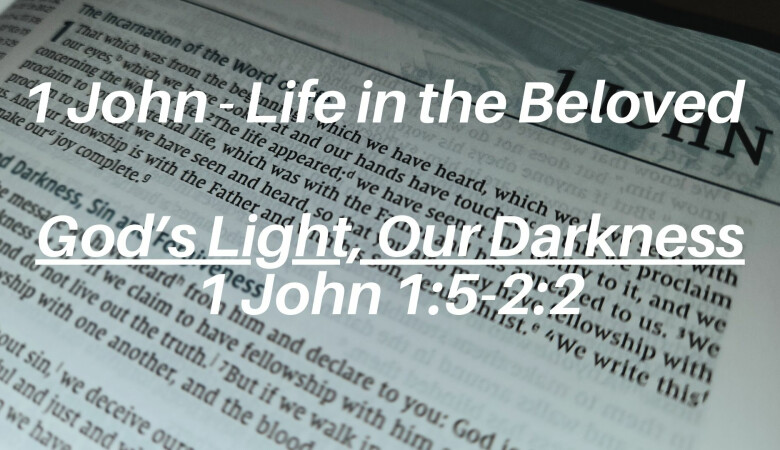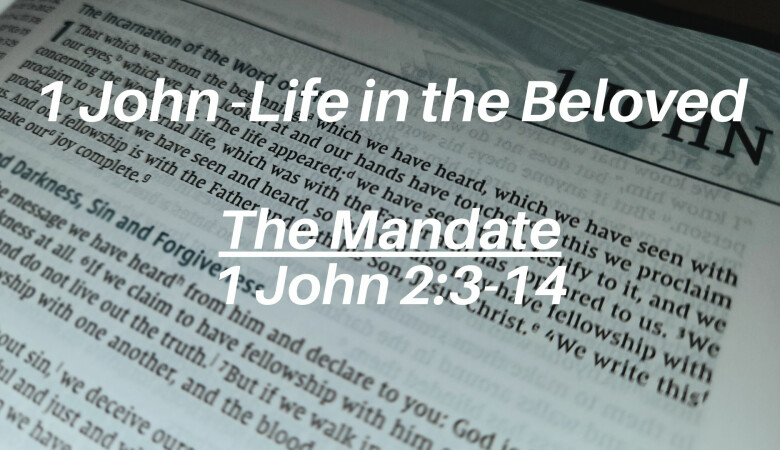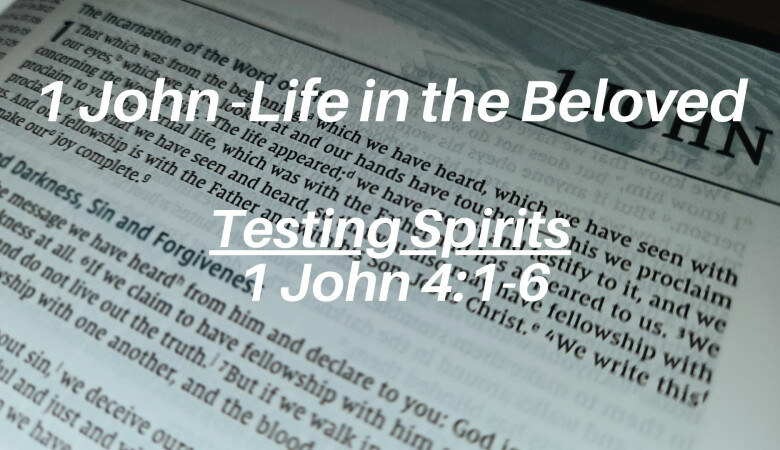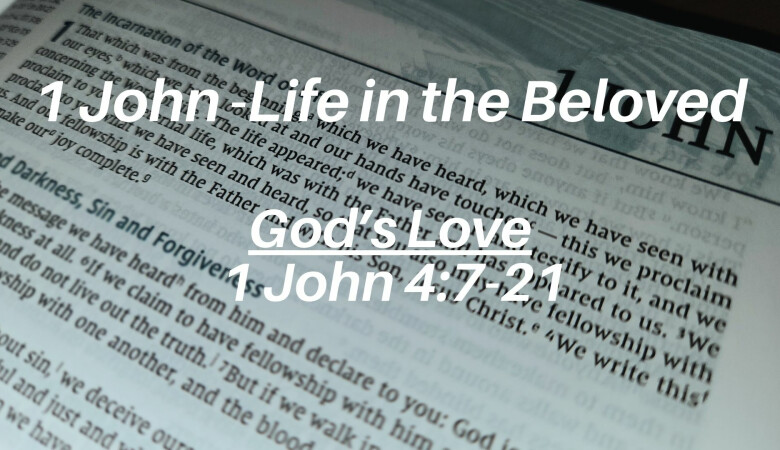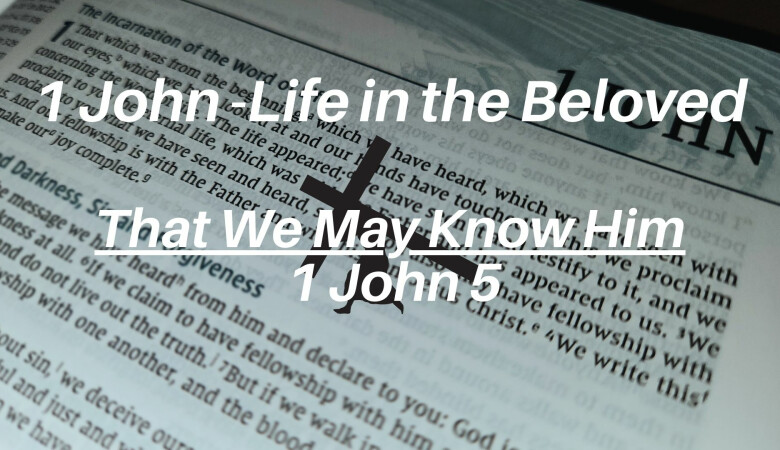Series: Life in the Beloved
Light Against the Lie
October 08, 2023 | Peter Rowan
Passage: 1 John 2:15-27
ALL SERMONS IN SERIES
Summary
John continues his discussion that he started early about being people of the lie. In Ephesians Paul tells us that we do not wrestle against flesh and blood, but against the cosmic power over this present darkness (Ephesians 6:12). Here in 1 John 2, John tells us not to love the world and by that he means don't buy into a world where the lies of the evil one reign supreme. There were those who had given into the anti-messiah idea that the offspring of the woman hadn't crushed the head of the serpent, because God can't come in the flesh. John says that's the great lie. The desires of eyes that brought destruction to Eden is the same lie that brings death now. It's the lie that says we don't need God. We don't need his word and we don't need him walking with us then or now. But the light shines in the darkness, exposing the evil and revealing truth.
Transcript
The last church that was constructed under the Byzantine Empire was the great Hagia Sophia (“Holy Wisdom”) in it’s capital city, Constantinople, modern day Istanbul in what is now Turkey and just about due north of where John was writing this letter of 1 John. Constantinople was conquered in the Ottoman conquest in 1453. There is an inscription written in tile up on one of it’s walls that is attributed to the great theologian of the 4th century Gregory of Nazianzus. Νίψον ἀνομήματα, μὴ μόναν ὄψιν, “Wash your hearts, not only your hands.” If you could see that phrase in greek, as I read it to you, you would notice that it is a palindrome, somewhat reads the same backwards as it does forwards. Like these words and phrases:
Mom
kayak
rotator
Step on no pets
Was it a car of a cat I saw?
A man, a plan, a canal — Panama!
Scottish poet Alastair Reid's "T. Eliot, top bard, notes putrid tang emanating, is sad; I'd assign it a name: gnat dirt upset on drab pot toilet."
And Weird Al Yankovic’s song “Bob” is composed entirely of palindrome’s.
But this week I was thinking of this passage that is before us. It’s a passage about liars and living, about whether God lives in the flesh or whether a fleshly living without God is better. So I listened to a book that I had read years ago by M Scott Peck called “People of the Lie.” It’s a very important book and I would recommend it to you with this caveat - it has some very difficult content, some very disturbing stories. Peck was a psychiatrist. He was the chief of psychology at the Army Medical Center in Okinawa after WWII and assistant chief of psychiatry and neurology in the office of the surgeon general in Washington, DC. Religiously he moved from Buddhism to an Islamic mysticism and ultimately to a deep conviction in Christianity. Through his work he became deeply convinced that evil needed to be a psychological category.
He says this: The evil hate the light- the light of goodness that shows them up, the light of scrutiny that exposes them, the light of truth that penetrates their deception.
Evil people hate the light because it reveals themselves to themselves. ... They will destroy the light, the goodness, the love in order to avoid the pain of self-awareness. ... [E]vil is laziness carried to its ultimate, extraordinary extreme.
He says that where there is evil there is always a lie and where there are lies there is always evil, but he also says that where evil is there is the opposite of life.
“Live” and “evil” are a palindrome. One is the exact opposite of the other!
Now, I want us to move to consider our passage, but as we do that I want to remind you that there are really three big question of religion. Here they are:
- Is God there? Does the divine exist?
- If he is, does he care? Does he know the evil of this world? Does he know of suffering? Does he care about sin and its effects?
- If he cares, is he going to do anything?
This passage addresses these great questions, but it does so through two warnings and an encouragement. Two warnings and an encouragement.
A Warning about denying God’s presence.
A Warning against denying God’s care.
And an encouragement that he has done something!
The warning of denying God’s presence.
15 Do not love the world or the things in the world. If anyone loves the world, the love of the Father is not in him. 16 For all that is in the world—the desires of the flesh and the desires of the eyes and pride of life—is not from the Father but is from the world. 17 And the world is passing away along with its desires, but whoever does the will of God abides forever.
Now, this is a passage that has really been abused. It’s been abused by Christians. The world is just going to burn up anyway, so only care about souls, not feeding the hungry, not seeking fair housing, not building lasting building, not delighting in bread that strengthens our heart, oil that makes that makes our face shine or wine that gladdens our hearts. And we know that its not right to just say “do not love the world” and just take that as meaning anything of this fleshly existence because we read in John’s gospel that “God so loved the world that he gave his only son!” So, how do we understand this. Well, I think the best way is to understand it as the world apart from God. You see there in verse 15 that love of the world is said in opposition to love of the Father. And then 16 jumps us back to the garden. In Genesis 3:6 we read that the fruit was “a delight to the eyes” and to be desired, just like her in verse 16 we read that the things of this world are “the desires of the flesh and the desires of the eyes and pride of life.” It’s harkening us back to the first lie. Which is that it might be better if we were in the place of God!
You see, the first warning here in 1 John 2 is the warning against believing that God is not there or that we would be better off if he was’t there. And that lie is in direct opposition to life, abiding forever.
Now, let’s just sit in this for a moment. At the heart of sin is the rejection of God. At the heart of sin is pride, thinking that we know better than God and that we might as well live as though he doesn’t exist and we can call the shots. But where does that lie get you? I’ve said recently that sin creates distance, distance from God and from one another. When we sin we are tempted to cover up, to put something in the dark, to not expose it and speak of it and own it. Peck says that the evil in the world are not evil because if their sin per se, but because of their refusal to acknowledge it, which is why the worst things in the world often come from spiritual fat-cats, people that seem to have their stuff together - to know how to speak of God but refuse to really know him. He says that in all of his work he almost never found people really evil who were in prison or on death row because they were forced to acknowledge their rejection of God and his ways, instead they are the people in the pews who look like they have it all together but who refuse to sit in the discomfort and pain of significant self-examination They do this because they have made themselves out to be perfect, to be God.
Do not learn to love a world outside of the intimate presence of God. It leads to lying and to death.
The second warning does not speak so much to our rejection of God, but to the rejection of his care.
Warning against denying God’s care
18 Children, it is the last hour, and as you have heard that antimessiah is coming, so now many antimessiahs have come. Therefore we know that it is the last hour. 19 They went out from us, but they were not of us; for if they had been of us, they would have continued with us. But they went out, that it might become plain that they all are not of us. 20 But you have been anointed by the Holy One, and you all have knowledge. 21 I write to you, not because you do not know the truth, but because you know it, and because no lie is of the truth. 22 Who is the liar but he who denies that Jesus is the Christ? This is the antichrist, he who denies the Father and the Son.
Here’s is another passage that is kind of tricky to get. And it’s tricky because late 20th century American Christian’s have been obsessed at times with the “Antichrist” and it really does make it harder for us to listen to what John is actually saying. It’s not unique to 20th c America. No, in fact, in ancient Palestine, Jesus wasn’t the only one to claim messiah. So there was confusion. But at the heart of this confusion is the idea of God’s care, his Messianic care.
The denial John is talking about is Jesus as Messiah, the denial of God’s care.
Again, go back with me to the garden. The questions of the first sin was a question of God’s perfect care. Does God care for us if he withholds something from us? Does God care that we live a life of covering ourselves us and hiding and living in the dark? Does God care for us enough to deal with this deceiver that lied to us and invite us to do something that make the darkness seem better than the light? And if you go back to the garden what you see is the first promise of the Messiah. “The seed of the woman will crush the head of the serpent!” God’s first promise that he is not only there but cares immensely for a world torn apart by lies and by darkness and by sin and one day that evil will come face-to-face with a woman’s offspring (“seed”) and that seed will win!
The great ant-imessiah claim in 1 John is that God doesn’t come in the flesh! That’s what 1 John 4:3-4 tell us - that at the heart of the spirit of anti-messiah! - God doesn’t come in the flesh. God can’t be the seed of a woman. God doesn’t really care.
John says, don’t buy that lie! Don’t buy it! Don’t listen to the father of lies because that has only ever lead to death! Don’t buy the lie that God doesn’t see you, that he doesn’t know you, that he doesn’t care about you, that he hasn’t come for your in the incarnation of Jesus. Don’t buy it.
So, two warnings. A warning against denying the presence of God and a warning against denying the care of God.
I think this little section here ends not so much with a warning, but with an encouragement.
If the great questions of religion are: Is God there? Does he care? Is he going to do anything. John has said, he’s there. He cares. And he has done something.
An encouragement that God has shown up
Let’s pick up in verse 23:
23 No one who denies the Son has the Father. Whoever confesses the Son has the Father also. 24 Let what you heard from the beginning abide in you. If what you heard from the beginning abides in you, then you too will abide in the Son and in the Father. 25 And this is the promise that he made to us—eternal life.
26 I write these things to you about those who are trying to deceive you. 27 But the anointing that you received from him abides in you, and you have no need that anyone should teach you. But as his anointing teaches you about everything, and is true, and is no lie—just as it has taught you, abide in him.
Twice here he mentions “what you heard form the beginning”. Now, John doesn’t tell us exactly here what he means by that, but almost everyone agrees that he means the basic apostolic message of the life, death and resurrection of Jesus. The mystery of our faith, “Christ has died, Christ is rise, he will come again.” John’s own gospel begins. “In the beginning was the Word… and the light shines in the darkness and the darkness doesn’t overcome it. . . .and the Word because flesh and dwelt among us and we have seen his glory, glory of the only Son from the Father.”
And John is now telling us God has done it! God has done it! He is not only there, but he cares and he has come! Perfect Goodness came into this world of sin. Perfect light shines in the darkness and the darkness didn’t overcome it. The seed of the woman has crushed the head of the serpent.
Here’s the reality. Evil, truly evil things, happen because darkness allows them to fester and to grow. One lie gives way to another and where there are lies there is death. But as you abide in what you have heard from the beginning, you can have life, life abundantly, life eternal. Your sin is so bad that God had to die for you, you are so loved that God willingly died for you. Your sin is so bad that God had to take on flesh to crush the deviser and the lying that says it’s not a big deal and God doesn’t really care about you anyway, but he joyfully comes to look evil in the face and conquer it!
This is sort of a longer quote, but I want to read to you how Peck end’s the audio version of his book (which he reads).
"The healing of evil, scientifically or otherwise, can be accomplished only by the love of individuals. A willing sacrifice is required. The individual healer must allow his or her own soul to become the battleground. He or she must sacrificially absorb the evil. Then what prevents the destruction of that soul? If one takes the evil itself into one’s heart, how can one’s goodness survive? Even if the evil is vanquished thereby, will not the good be also? What will have been achieved beyond some meaningless tradeoff? I cannot answer this in language other than mystery. I can only say that there is a mysterious alchemy whereby the victim becomes the victor. I do not know how this occurs. I know that good people can deliberately allow themselves to be pierced by the evil of others, be broken thereby, and yet somehow not broken, to even be killed in some sense and still survive and not succumb. Whenever this happens there is a slight shift in the balance of power in the world."
He is speaking about psychotherapy, he is speaking about interpersonal care, he is speaking about the willingness to look evil in the face in your own life. But he sure sounds to me like he is speaking about Jesus.
Jesus, God in the flesh came not so you can just wash your face and look good, but so that your sins can be confessed and brought into the open killed so that you can have life!
Series Information

The book of 1 John is a letter from the last remaining apostle to group of house churches he oversees near Ephesus. It is a message of encouragement to saints who have grown weary with the unbelief of those around them. John writes to them and us as one who has known and been known by Jesus - and has found Jesus to be full of light, kindness and love.


